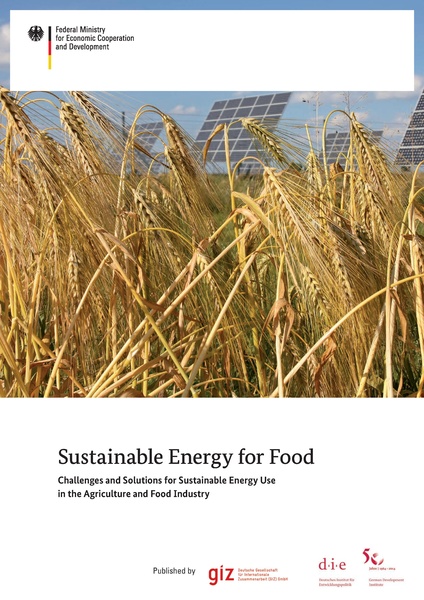File:Sustainable Energy for Food Documentation.pdf
 Size of this JPG preview of this PDF file: 424 × 600 pixels. Other resolution: 170 × 240 pixels. |
Original file (2,480 × 3,507 pixels, file size: 0 bytes, MIME type: application/pdf, 60 pages)
Summary
| Description |
English: According to conservative estimates, producing food and getting it to the table accounts for around 30% of energy consumed worldwide, most of which is provided by fossil
fuels. In places where renewable energies such as biomass already drive agricultural value chains, particularly in the developing world, they often originate from traditional sources – fuelwood, for example, which in most cases is harvested in unsustainable ways. With world population on a path of unbridled expansion and energy resources in dwindling supply, experts in science, business, civil society and development cooperation who are active in the energy and food sectors all face the same problem: how do we produce more food using as little energy as possible, while increasing the share of renewable energy? The GIZ-DIE symposium ʻSustainable Energy for Food’, held on 12 June 2014 in Bonn, Germany, placed itself at just this juncture. With a line-up of 16 speakers drawn from development cooperation and research in energy and agriculture, the symposium sought to provide a comprehensive overview of where the various stakeholders stand on the issue. Input from project managers, researchers and finance officers in working groups during the afternoon hours supplied additional perspectives rooted in hands-on experience. Collaboration and project work are crucial to making progress in the overlapping areas of sustainable energy and food, for although the international community finds itself facing unprecedented challenges within this nexus, possible solutions are to be found there as well; indeed, energy- and climate-smart technologies and practices, as the FAO has come to call them, already abound in agri-food systems. The challenge is to identify them and to fully develop their upscaling potential. The ultimate obstacle looming over any effort that targets sustainable energy and food, be it a small-scale applied project or a sweeping international campaign, is also the key to its success: mainstreaming. Recognising that knowledge management and dissemination are of utmost importance to achieve excellent results in the field, the German Federal Ministry for Economic Cooperation and Development (BMZ) joined forces with the United States Agency for International Development (USAID) the Swedish International Development Cooperation Agency (SIDA), OPIC and Duke Energy to found to found the global initiative ʻPowering Agriculture: An Energy Grand Challenge for Development’. The overall objective is a shared one: the integration of innovative clean-energy solutions into developing countries’ agriculture sectors as a means of increasing agricultural productivity and value. On behalf of the German Ministry, GIZ implements the German contribution to the international initiative and complements its activities through the project ʻPowering Agriculture – Sustainable Energy for Food’. Under this theme, GIZ focusses on knowledge management and networking, training and implementing model projects in cooperation with private and public partners. The symposium was a kick-off meeting for a network of experts on the energy and food nexus, designed to spawn designed to spawn personal contacts within what has up to now been a very loosely knit community. The lively exchange and sharing initiated there will continue, it is hoped, on a newly founded virtual platform, the Powering Agriculture wiki portal. This documentation is intended to serve as one of its resources, and as a stimulus for further discussion. |
|---|---|
| Source |
Deutsche Gesellschaft für Internationale Zusammenarbeit (GIZ) GmbH |
| Date |
2015-05-22 |
| Author |
Edited by Geoffrey Schöning |
| Permission |
See license tag below. |
Licensing
| This file is licensed under the Creative CommonsAttribution-NonCommercial 3.0 International license. | ||
|
File history
Click on a date/time to view the file as it appeared at that time.
| Date/Time | Thumbnail | Dimensions | User | Comment | |
|---|---|---|---|---|---|
| current | 08:35, 22 May 2015 |  | 2,480 × 3,507, 60 pages (0 bytes) | ***** (***** | *****) | User created page with UploadWizard |
You cannot overwrite this file.
File usage
There are no pages that use this file.




















